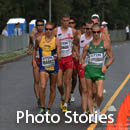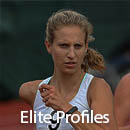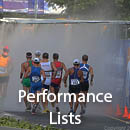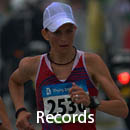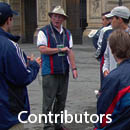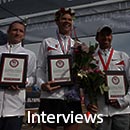KATIE BURNETT
You probably have one of the most unique pre-race walking athletic resumes. Can you fill people in who don’t know your background and how you came about excelling in race walking?
I started participating in track when I was 13 at my junior high school. I was doing every event I could because I wanted to see what I was good at. I luckily excelled at many events. Specifically, I took to the field events rather naturally. I did start race walking my first year of track in the summer as part of the Junior Olympics, but I did not seriously train for it. It was just another event to me and I didn’t have a coach to make it a priority.
When I reached high school, I focused on the throws and jumps. I had a very experienced throws coach who helped me place at the state level. By my junior and senior year, I was almost exclusively focused on the throws. In the summers, I took to competing in as many events as I could in the Junior Olympics. I like to challenge myself, so the heptathlon definitely piqued my interest. Imagine doing seven events over two days, and then doing five more events the next two days. That was often how my regional-level meets were during the JO’s. Getting through the 3000 or 5000-meter race walk was a part of that.
After graduating high school, I went to the University of Arizona, where I was a walk-on to the track team as a javelin thrower. I qualified for the team but only competed there my freshman year. Unfortunately, a past shoulder injury flared up from all the throwing and kept me from progressing as much as I wanted. This, along with the stress of being at such a large educational institution, led me to transfer to William Penn University in Iowa. I was able to receive a track scholarship there and my interest in race walking was rekindled since it was a scoring event in the NAIA, unlike the NCAA.
I understand that you had a unique double while competing at William Penn University. What was that like?
At first, I was much more focused on the javelin among other events. It wasn’t until I competed at the national level that I really thought the walk could be my event. I continued working on balancing training for various field events with my increasing walking training. Being at a small school and on a small track team, I helped out in several events at conference and was able to score in high jump, shot put, pole vault, and the heptathlon over my tenure.
I went to nationals in both the walk and the javelin all three years that I was at William Penn. I was All-American (top six) every national competition that I competed in for the race walk. I received my 6th All-American the day before my last collegiate race walk national race when I placed 3rd in the javelin with a huge personal best of 43.03 meters. At that point I had switched over to nearly all my training being oriented towards walking, so I thought that was a good sign that my overall fitness was improving. Over my collegiate career I earned 7 All-American distinctions.
What did you do when you graduated college?
After I graduated in December 2011, I decided to focus on training for the Olympic Trials while I figured out what I wanted to do with the rest of my life. I wound up back home in Bellevue, Washington and trained there on my own.
During that period, you had quite a breakthrough and qualified for the World Cup in Russia. Did you expect to make the team?
That was certainly my goal in training and in the race that’s all I cared about. I kept telling myself, “I have to get to Russia.” The trials race was a very cold, miserable day. My legs started tightening up (as many others’ did) and it was increasingly harder to keep going every lap of the course. I ended up finishing fourth. I was ecstatic and a bit in disbelief that I had actually made my first USA team. The fact that I had done what I went there to do was very surreal to me.
What were your goals going into the World Cup?
I wanted to try to place top three on the team since I came in as the 4th person. Depending on the conditions, I hoped to PR.
So what happened in the race?
The race was in the middle of the day and the hottest day of the year for me (coming from the mild Washington weather). On the course it was probably 90 degrees in the sun and there was a headwind at both ends of the course, which had about 9 meters of elevation change end-to-end. I had also overworked myself in the weeks prior to the race. Even with rest and the help of Maryanne Daniel, our medical staff member, I still didn’t feel ready on race day. I slept maybe 4 hours the night before the race. I started the race conservatively and moved up in position as the race went on, which I had intended to do. I finished somewhere in the 70’s place-wise and in a time that was far off my PR.
Was that difficult emotionally knowing you had the Olympic Trials coming up?
Absolutely, it was. The experience going to Russia was quite amazing, but it was difficult to recover mentally from what I felt was a poor race performance. Especially since I had been working so hard. It drove me to work harder instead of smarter and I became very stressed out over mundane issues.
Well you said it before I did. I couldn't help but question whether training by yourself was ideal. What would you do differently if you had to do it over again?
The issues I was struggling with go back to earlier on in the year. 2012 was a rough year for me overall. There was quite a bit of stress external to race walking that worked its way into my walking. I coped with my troubles by becoming very neurotic about training. It is not a good mental state to be in over a long period of time. I tried training with others, but it only made me want to do more faster to get better and I was disappointed when I would have a really good week followed by a week where all I would do was try to recover. Since I can’t change the past, I’m hoping this next year will be my second chance of sorts.
I guess the Olympic Trials disqualification didn't help matters, but I understand you've rebounded and refocused toward 2016. What lessons did you learn from the disqualification and how do you see yourself moving forward?
I was very upset about the disqualification. I was mad and angry and really wanted to quit. But the more I thought about it, the more I thought about how this shouldn’t be what makes me leave the sport. To just quit after putting in so much work because I was shot down by a judging decision wasn’t the way to go. I had been working on fixing my technique and I knew that’s what I needed to keep focusing on. I determined what I wanted to do for the Fall and got to work on that. Unfortunately, I started back too soon after the Olympic Trials race. I overworked myself so much that I knocked one of my lumbar vertebrae out of alignment and had severe sciatic nerve pain. I took nearly a month off of training as a result.
Once I got back to training, I decided I would try the 30 km Nationals. I simply didn’t feel I would have the speed for a fast 20 km walk to finish the season, so I thought it would be a good alternative. I managed to complete my first 30 km race after only walking the distance once in training the Monday before the Sunday competition. I finished second to Maria (USA’s 2012 Olympian) by a minute.
2012 was a year I’d like to forget, but there are many lessons that I learned from my struggles of the year. I hope to redirect myself for 2013 and establish that 2012 is over by getting to where I could not last year. My current plans are to try to make the Pan American Cup team to Peru and to obtain the IAAF B Standard. Remembering 2012 and not making those mistakes again will surely help me reach those goals.
